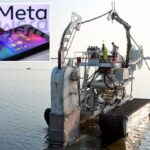Meta Plans to Build World’s $10 Billion Undersea Internet Cable: Report
Meta, the parent company of Facebook, Instagram, and WhatsApp, is reportedly planning to build the world’s most expensive undersea internet cable—a project estimated at $10 billion.
Elon Musk slams California Gov. Gavin Newsom for ‘crazy’ move to exclude Tesla from rebate plan
This texting habit means you have higher emotional intelligence, according to science
Trump Taps Antitrust Hawk Gail Slater to Take Over DOJ’s Successful Docket of Monopoly Cases
LinkedIn Co-Founder Reid Hoffman Considers Leaving US After Trump Win: Report
This ambitious initiative reflects Meta’s commitment to expanding global internet access, improving connectivity speeds, and reinforcing its dominance in digital communications.
But a project of this scale also raises questions: Who benefits the most? How will it reshape global internet infrastructure? And what are the potential risks?
Apple’s New AI Could Leak Sensitive Data, Experts Warn – Take These Steps to Protect Your Privacy
Meta’s Mark Zuckerberg wants ‘active role’ in shaping Trump’s tech policy, says exec Nick Clegg
Human ‘washing machine’ uses AI to wash your dirty body – because people are now too lazy to shower
LinkedIn Co-Founder Reid Hoffman Considers Leaving US After Trump Win: Report
Let’s explore the details, advantages, drawbacks, common questions, and public reactions surrounding Meta’s massive undersea cable project.
The Background
Undersea cables are the invisible backbone of the internet. More than 95% of global data traffic passes through fiber-optic cables lying deep in oceans, connecting continents. Tech giants like Google, Amazon, and Microsoft have already invested billions in such cables to secure faster, more reliable internet access for their users.
Now, Meta is joining the high-stakes race with what could be the largest and most advanced cable system ever constructed, designed to handle surging data demands from its billions of global users.
Advantages of Meta’s $10 Billion Undersea Cable
- Faster Internet Speeds: Improved infrastructure will reduce latency and boost connectivity across continents.
- Global Reach: Developing regions in Africa, Asia, and Latin America could see better internet access.
- Economic Growth: Improved connectivity supports e-commerce, digital jobs, and remote work.
- Innovation Boost: Developers and businesses will benefit from reliable data transfer.
- Meta’s Ecosystem Growth: Better infrastructure strengthens Meta’s apps and metaverse ambitions.
- Reduced Dependence on Third Parties: Owning its own cable system means Meta isn’t fully reliant on telecom providers.
- Future-Proofing: A $10B system ensures bandwidth capacity for decades.
- Competitive Edge: Meta gains leverage over rivals by controlling more of the internet’s backbone.
Disadvantages of Meta’s $10 Billion Undersea Cable
- Monopoly Concerns: Critics argue Meta controlling infrastructure could centralize too much power.
- Geopolitical Risks: Undersea cables often spark disputes over sovereignty, security, and surveillance.
Frequently Asked Questions (FAQs)
- How much will Meta’s undersea cable cost?
Around $10 billion, making it the most expensive project of its kind. - Why is Meta investing in undersea cables?
To improve global connectivity and ensure its platforms perform faster and more reliably. - Who else is building undersea cables?
Google, Microsoft, and Amazon all have major undersea cable projects. - When will Meta’s cable be completed?
Reports suggest construction will take several years, possibly extending into the late 2020s. - How do undersea cables work?
They are fiber-optic systems laid on the ocean floor, transmitting data at near-light speeds. - Will this make internet cheaper?
Potentially, though it depends on local governments and ISPs. - Is this connected to the metaverse?
Indirectly—Meta needs massive data capacity to power VR, AR, and AI-driven experiences. - Could this cable face security threats?
Yes—undersea cables are vulnerable to physical damage, hacking, or geopolitical sabotage. - Will developing countries benefit?
Ideally yes, as the project aims to expand coverage in underserved regions. - Does this mean Meta will “own the internet”?
No, but it will control a critical piece of infrastructure, raising concerns about dominance.
User Testimonials
- James, 38: “If this means faster internet where I live, I’m all for it. Ten billion seems worth it.”
- Aisha, 27: “In Africa, connectivity is still a struggle. If Meta delivers, it could change lives.”
- Daniel, 45: “One company controlling cables feels dangerous. Too much power in one place.”
- Sophia, 32: “Meta isn’t doing this for charity. It’s about control, not access.”
- Michael, 41: “Still, better internet helps everyone. I’ll take it.”
- Priya, 29: “As a software developer, low latency makes a huge difference. Excited for this.”
- Lucas, 35: “Cables under the ocean? That sounds fragile. What happens if they break?”
- Nadia, 22: “This feels like the future. Companies building infrastructure governments used to handle.”
- Hiro, 50: “The price tag is insane, but so is the demand for internet today.”
- Elena, 30: “I’m torn—faster internet is great, but do we really trust Meta with global data?”
Meta’s reported plan to build a $10 billion undersea internet cable is one of the boldest infrastructure bets in tech history. If successful, it could transform internet speeds, expand global access, and cement Meta as a dominant force in digital communications.
Elon Musk Tesla’s $56 billion pay package rejected again by Delaware judge
Josh Kushner Defends Tech CEO Over Israel Visit: ‘Saddened by How Much Hatred People Have for Jews’
Apple illegally spying on employees’ personal devices, muting salary conversations: lawsuit
LinkedIn Co-Founder Reid Hoffman Considers Leaving US After Trump Win: Report
Smartphone users warned to delete 15 dangerous, ‘predatory’ apps: ‘A global threat’
At the same time, the project raises questions about corporate control, global security, and the balance of power in an increasingly connected world.
Whether viewed as a visionary investment or a concerning power grab, one thing is certain: this undersea cable could redefine how billions of people connect to the internet in the coming decades.

